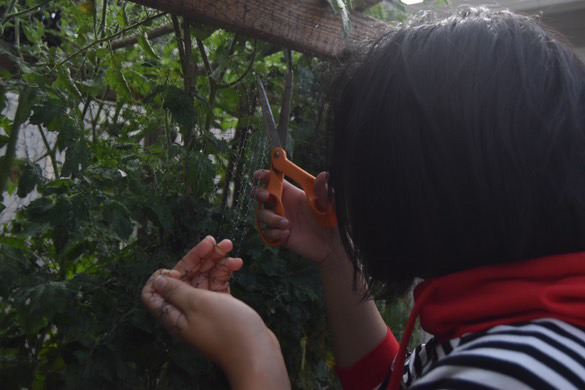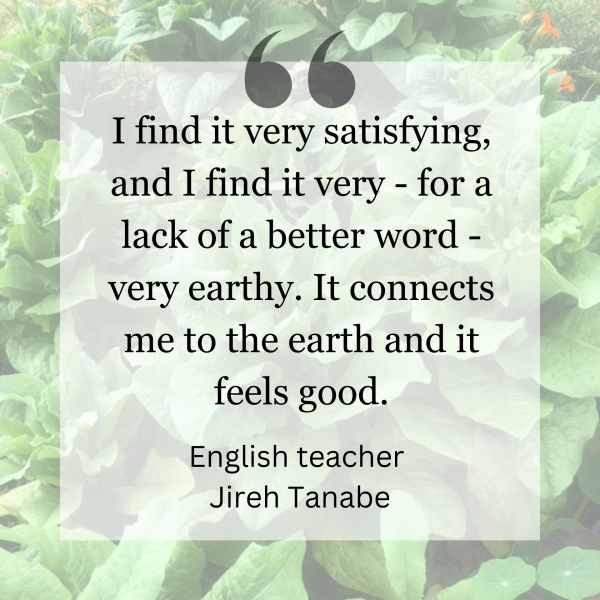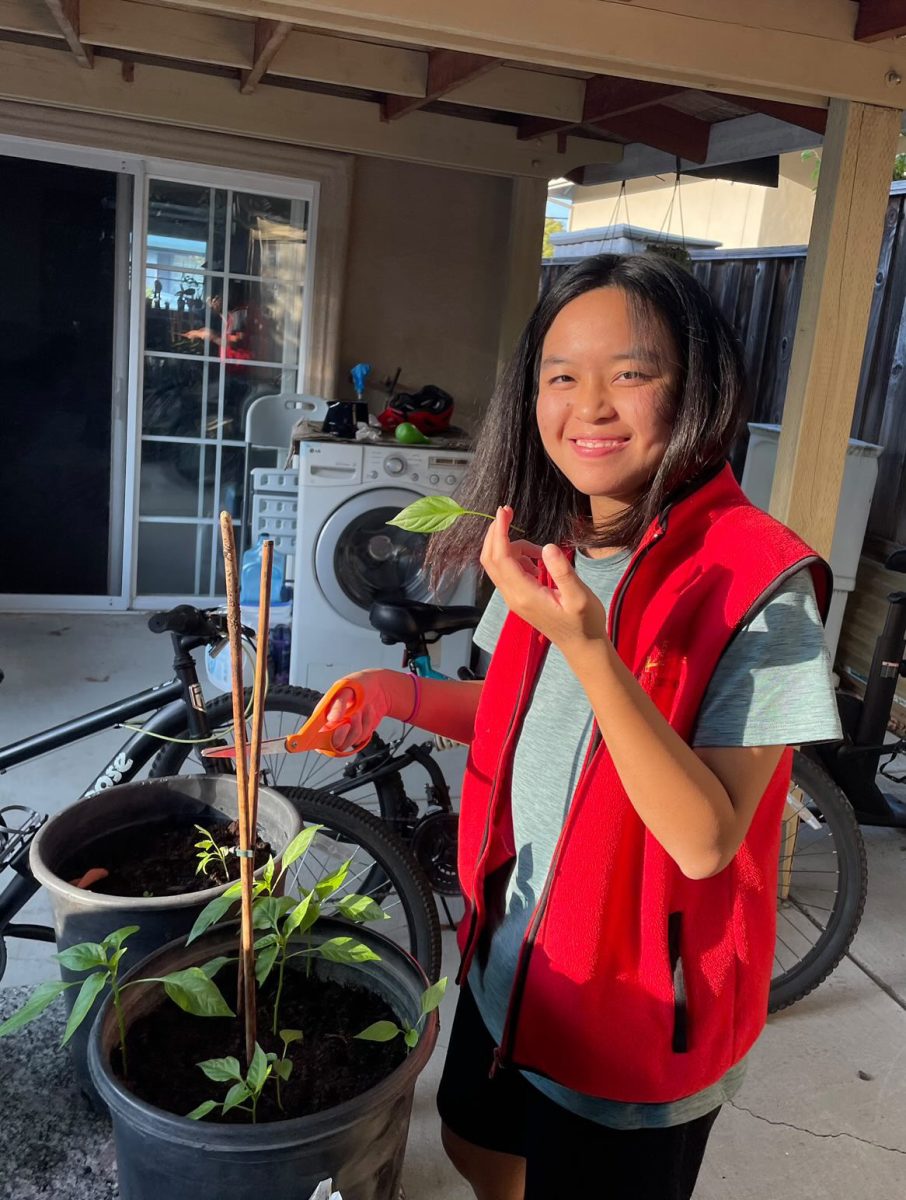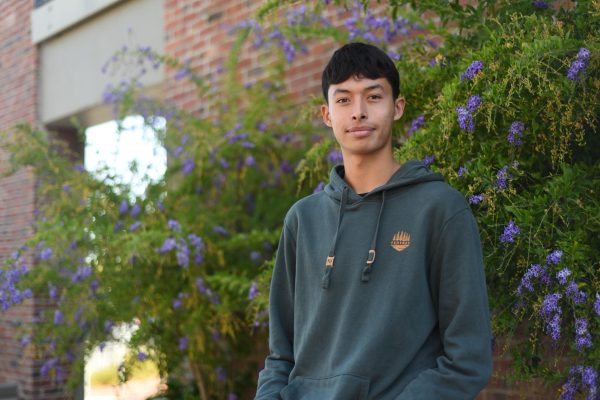As soon as she gets home from school every day, senior Bernice Kwong drops her school bag and rushes to her backyard to see her tomato, herb and cucumber plants that she has been growing since the beginning of the latest season. Like a detective investigating a crime scene, Kwong carefully examines each of her plants for any damage caused by bugs or other critters. Only after Kwong has determined that each individual leaf is untouched does she breathe a sigh of relief and head back into her house to get on with her day.
Kwong recalls her fascination with gardening starting when she visited one of her relatives and saw the size of the cucumbers they were able to grow. Since then, Kwong has started growing her own carrots, tomatoes, peppers and herbs in small pots outside her house.
“I really approached gardening mostly as a hobby, rather than something to get fruit or food from,” Kwong said. “It was a way for me to experiment and just spend my time outside. So I feel like the benefit of gardening would be learning about nature and about how you would grow your own food.”
Similar to Kwong, English teacher Jireh Tanabe got the idea to grow her own vegetables from relatives. Tanabe and her sister grew up helping out in their family garden where they grew chayote, green onions, apples, plums and tomatoes.
“I always grew up knowing that I could go outside and get food, vegetables or fruit to eat,” Tanabe said. “And I really enjoyed growing up that way, so when we moved into our house, one of the things that I wanted to have was edible plants, fruits and vegetables in our garden for our kids.”
Currently, Tanabe grows heirloom tomatoes, chiles, lemons and limes to eat and cook curries and salads with while her husband grows Fresno, Anaheim and Serrano chili peppers with aquaponics, a gardening method that uses nutrient-rich water from raising fish to fertilize soilless plants. The decision to start growing these chilies with aquaponics was made when Tanabe and her husband grew tired of buying chilies from the store. Tanabe also says that growing vegetables on her own has its own benefits as well.
“Growing your own food makes it taste that much better because it’s not commercially produced,” Tanabe said. “The taste, in and of itself, is not just fresher, but it’s sweeter, and it tastes like what it should taste like.”
Junior Luke Ma has a similar opinion on the differences between homegrown produce and store bought produce. Ma

and his family enjoy eating lots of fruits and eating healthy in general, which is why he grows oranges, lemons, zucchinis, blackberries, blueberries and dragon fruits in his backyard.
“In general, when growing your own food, you have more control over whether you fertilize it, when to water it and what type of compost it gets,” Ma said. “For example, I have a dragon fruit tree, and if you buy dragon fruit from the store it’s going to be pretty bland, but the dragon fruit in my yard are actually pretty sweet compared to the store bought ones.”
In addition to growing food to eat, Ma also gardens because it is good for the environment, and because it gives him a simple outdoor routine to follow, which he says is more enjoyable than just staying inside.
“Oftentimes I spend most of my time in the house doing homework or scrolling through TikTok, so it’s good to go outside every once in a while,” Ma said. “When you have plants that you have to take care of, otherwise they’ll die, it kind of forces you to go outside.”
Though Kwong, Ma and Tanabe all enjoy gardening for a variety of reasons, they all have trouble with a common problem — their plants are frequently targeted by local critters like bugs or gophers. Ma has even had issues with people wandering into his yard and taking his fruits. Tanabe shares how frustrating this can be.
“One season, I had beautiful different types of lettuce growing. I had romaine, I had red, I had arugula, I had all these different types of lettuce and I was so excited,” Tanabe said. “And then one day, I went out there and they literally disappeared into the ground, and I was so mad.”

Despite the difficulties Tanabe experiences from time to time, she still enjoys growing her plants. Tanabe describes the feeling of watching her plants grow as satisfactory.
“Sometimes I enjoy just seeing the fruit grow bigger and sweeter, and smelling the plants and smelling the dirt on my hands,” Tanabe said. “I find it very satisfying, and I find it very – for a lack of a better word – earthy. It connects me to the earth and it feels good.”
Kwong says that her garden is still in its beginning phases, and she hopes to continue to improve it and grow more plants in the future. In the meantime, Kwong says she will continue to garden even when something goes wrong.
“I don’t really remember the feeling of devastation when something dies, because right after I would be motivated to grow it again,” Kwong said. “I would say, ‘Oh my god, my plants die, but I want to keep going.’ So I think my motivation to keep gardening would have been just the fact that something dying isn’t exactly a failure, it’s a sign for me to keep trying again.”
In the future, Ma’s parents plan on moving away after Ma goes to college. However, he plans to keep his garden going by hiring a moving company to move their plants to their next home. In the meantime, Ma’s current goals for his garden include planting more native plants as they are friendlier towards the environment because they require less water and fertilizer to grow.
“To me, gardening is really about being self-sustaining and taking care of yourself,” Ma said. “Gardening is about taking care of your yard or house, developing a routine, sticking to it, and seeing your work pay off in the fruit and flowers you grow.”











